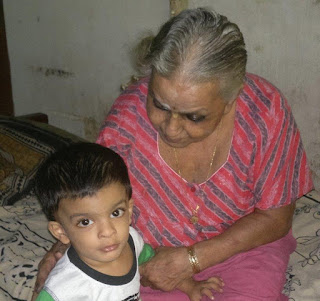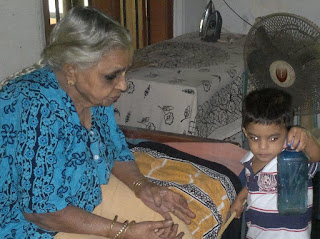My mother in law passed away recently. Now there is a deep void in our life, a loss we are yet unable to accept, an overwhelming sadness. However this post is on my triplets response to the sadness and loss. How does the death of a loved one affect a four year old child? Does he really understand what death is, that it is permanent? I think they do, their grief is real, and their love, unconditional.
My triplets (one month shy of 4-year old) were very fond of her. They met her for the first time when they were two months or so old. As toddlers they were not very friendly with relatives whom they see only once in a while. However, to her they had a surprising affection, which was quite mutual. From the beginning they behaved as if they had always known her- they chattered in the very friendly and familiar way. She was unwell and bedridden for the last year or so, and we used to visit her occasionally, about once in two months. Whenever they saw her they gave her water in a glass to drink, placing the glass near her lips, sat with her and sang nursery rhymes, told her stories of their nursery friends. On most of the days at home they used to refer to her, about something that she said, or something they imagined about her. They called her Dodda, meaning grandmother in Tulu. Probably their love for her came from the fact that their father adored her, or probably from the unexplained bonding of blood. In the last few months she could not even sit up without help, and my kids visited her for the last time, about a month back. We were planning another visit in the weekend, when the tragedy happened. At first we didn't know whether and how to tell the kids about it.
 |
| Balu with Dodda |
 |
| Raman with Dodda |
Now, I knew that they had an idea what death was. Their first encounter with it came when a kitten in our house- a tiny one, one week old- died due to birth problems. They saw how she was not moving, how dad buried her. Afterwards when they saw 'Lion King', they were very sad when Mufasa died, and they became hopeful later when Mufasa came in the clouds to lead Simba towards the right way. Still later they saw 'Spider-Man 3' in which Harry Osborn died and was buried. The ever-curious trio asked me for explanations, how the kitten was buried without a coffin whereas Harry had it, how come Harry or the kitten did not appear in the clouds etc. I told them the difference between burying an animal and a human, and that everyone who did good would have a place among the stars, but their loved ones could see them when they really, really needed them for guidance. My mother told them about rebirth- when one person dies, the soul could be reborn, and the cycle could continue. This satisfied them. Surprisingly, the concept of the mortal body, the immortal soul and rebirth did not confuse them at all! They also learned about heaven and hell, God and Devil, from (can you believe it?) 'Tom&Jerry'- in one of the stories called 'Heavenly Pass', they show Tom seeing both Heaven, Hell and the Devil. This particular cartoon educated them quite a lot, when we had a chance to discuss how the virtues on earth leads one to heaven, how wrong-doing, which essentially means harming someone or deliberately causing sorrow to someone, leads one to hell etc. Then again, they were familiar with stories of Ramayana where Jadayu, Sampathi, Baali, Kumbhakarna and Ravana die.
Thus, arming myself to face untimely and loud questioning, I took the trio to pay respect to their Dodda, to give a drop of theertham (holy water) to her still lips. They stared at the body and asked why she was lying on the floor and not on the cot, why there were lit lamps near her. When I softly and gently told them that she was no more, it took a while for them to digest it. There was surprise, a little fear, then the effort to comprehend it. They did not cry. They looked at her face for a long, long time, and watched all the procedures for the funeral. Gradually the cloud lifted, and they were back to their innocent selves. They started talking to each other assuring each other that Dodda's soul must be in Heaven, with God now, or possibly with the stars. She might take a rebirth too. No one but me completely understood what they were saying in their kiddish chit-chat. All this made me feel guilty for taking them there because the mourning sons, daughters and in-laws, including their own parents were finding it difficult to hold back tears and the loud chatter was so out of place. But then I had to do that, too. I had to make sure that they knew what happened to their beloved Dodda, else they might wonder about it when they visit her house next time and not see her. It was important they understood that everyone and everything had to go one day. I took them there thinking all this, and in turn they taught me few lessons- that a child is never too young to understand death, however their perception of death is not as a permanent loss, but as one occurrence in a continuum. It is not losing hope, but being hopeful about the continuing life cycle. These thoughts come after processing bits of information they gather from adults, but as an adult I might never come to terms with death as they do- with innocence, certainty and hope.